Red chanterelles also known as the cinnabar red chanterelle (Cantharellus cinnabarinus) are a beautiful, delicious edible mushroom that's easy to identify.
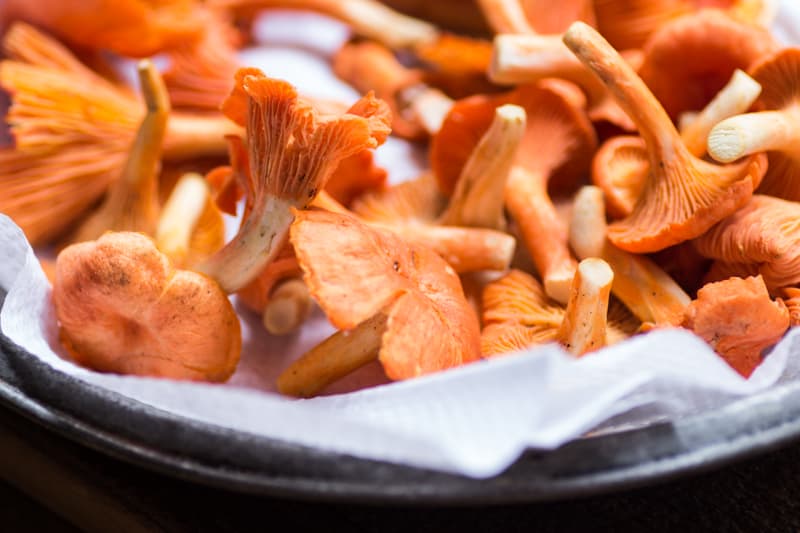
Red chanterelles are closely related to their more well-known cousins: golden chanterelle mushrooms, and they have the same fruity aroma that reminds me of apricots. It's common to find both mushrooms growing near each other. Seeing their pop of reddish orange hiding in the leaves is a great compliment to fall colors.
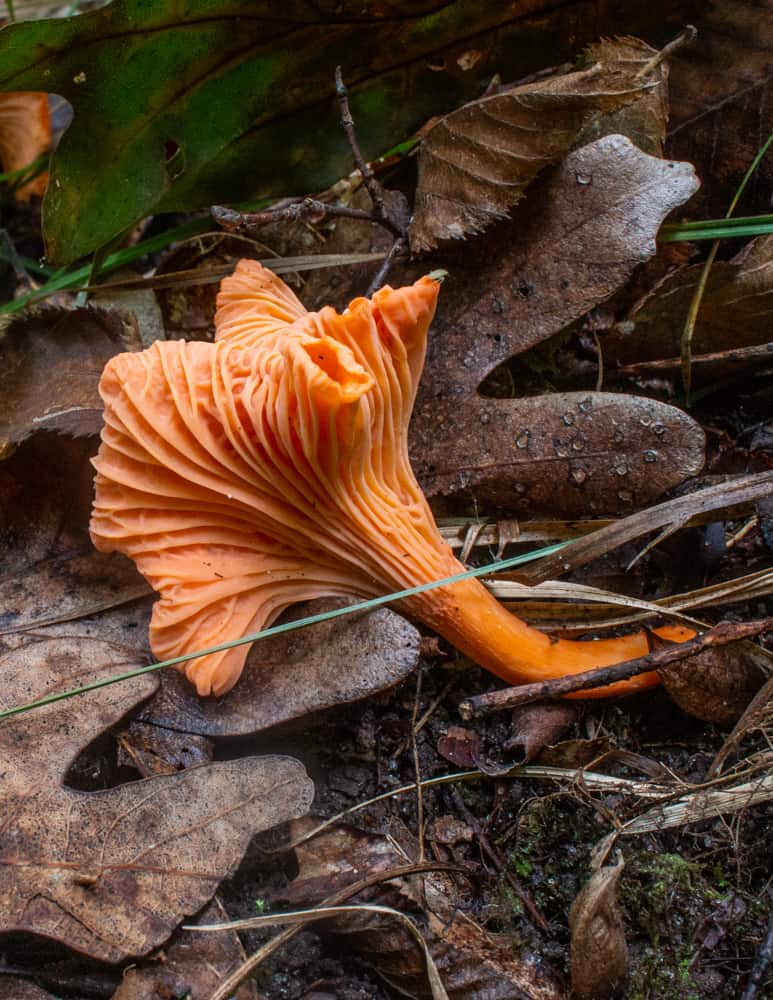
Where To Find Red Chanterelles
Cinnabar mushrooms are widely distributed in hardwood forests in Eastern North America. I start to see them in July and through august in the Midwest. Mostly I see them growing with red oak and burr oak trees in patches where golden chanterelles grow.
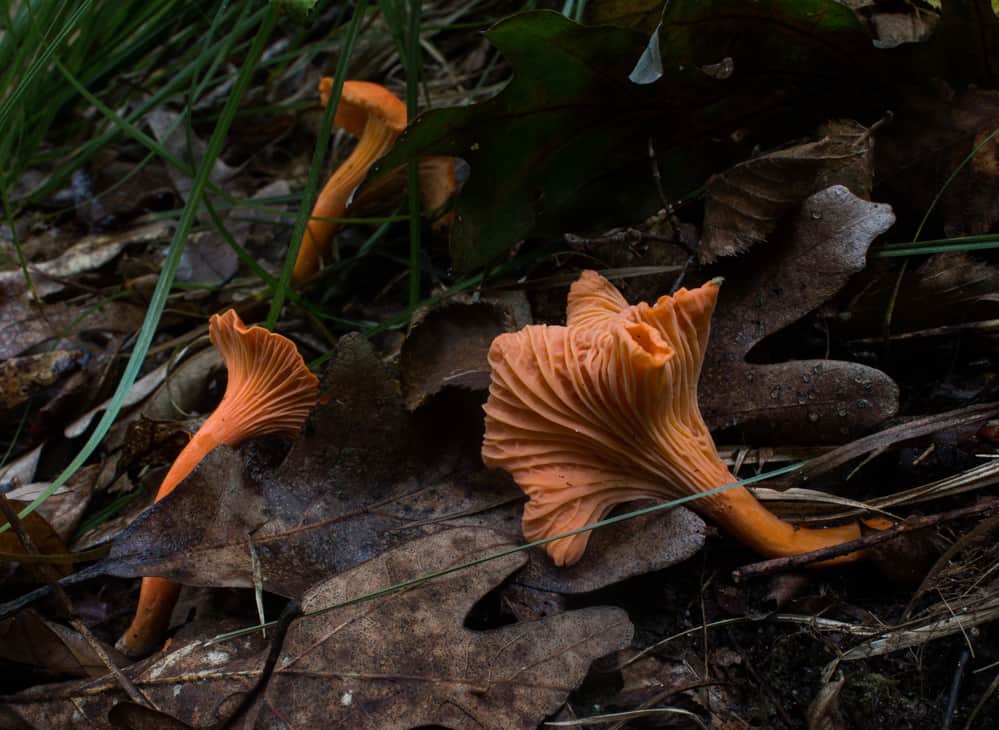
They also grow with beech, shagbark hickory, and big-toothed aspen in some places.
Some years seem to be better than others, and, unlike golden chanterelles that dependably come every year, some years the red cinnabars are very sparse. On good years, I can sometimes pick them in large amounts and they seem to carpet the forest floor.
Identification
Just like their cousins, red chanterelles are easily identified by red color, which can vary to light orange, pinkish cream or flamingo pink. The most important characteristic to look for is under the cap.
Chanterelles always have false gills
If you've read about chanterelles in a field guide, you'll know that even more important than the color is looking underneath the cap. Instead of true gills, chanterelles will always have false gills, or veins that run down the stem.
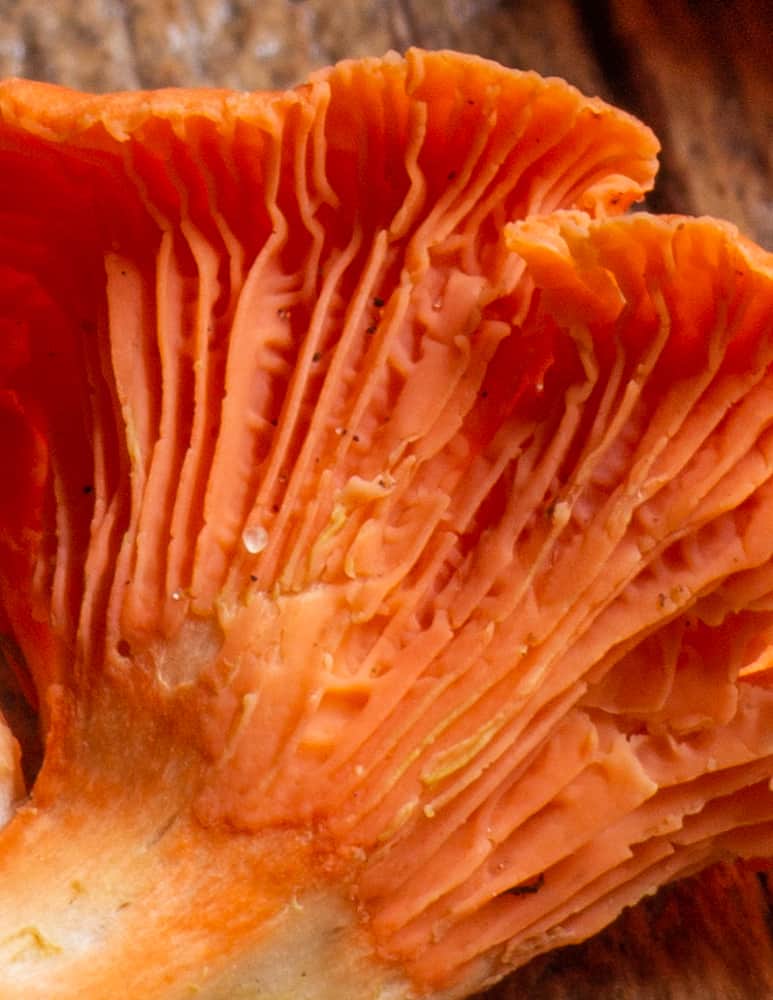
As the veins near the edge of the cap, you may see forking or splitting. These are usually smaller than most golden chanterelles, but don't let their size fool you: these are just as delicious as their more well-known cousins. They have a white spore print.
Look a likes
There are some look a likes, thankfully none that I know would harm you. The most common mushroom you could confuse with red chanterelles, at least in my area, are Hygrocybe, or waxy caps, especially H. coccinea.
Hygrocybe are smaller than red chanterelles, and more brittle. Their color is also a mix of red and yellow, and they have true gills, as opposed to veins like true chanterelles. I know some people that have eaten them, but no one that's liked them.
Different species
So far I've found two different types of red chants in my area.
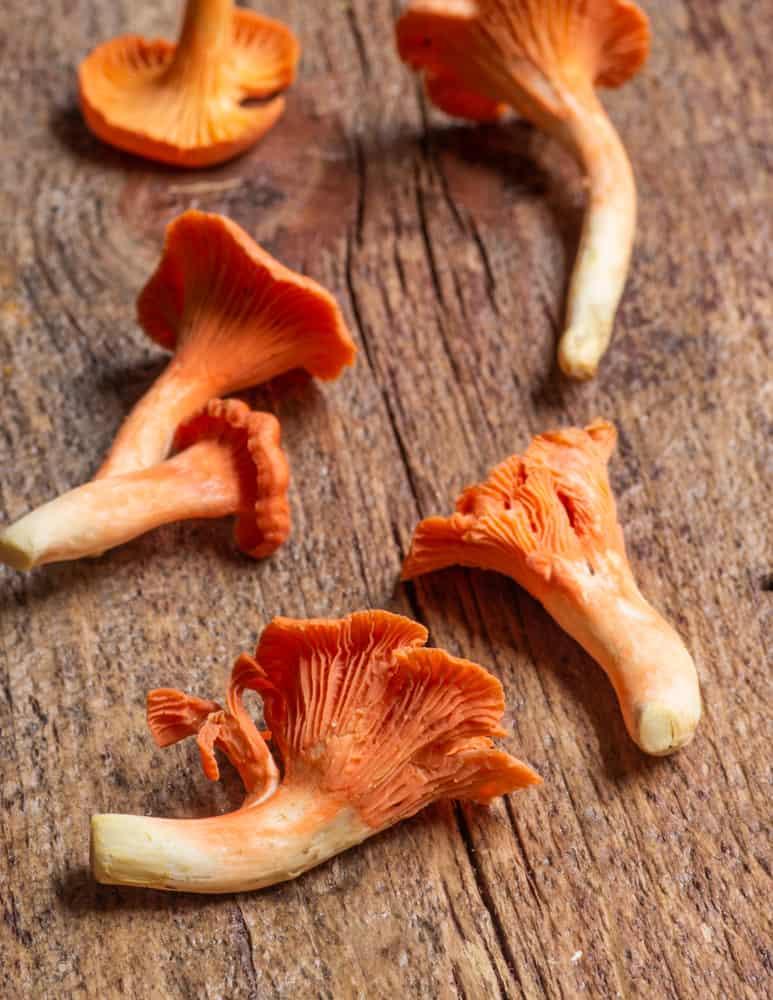
One is more robust, with the stem becoming white near the base, the other is smaller, and completely red. Both are good and can be cooked similarly
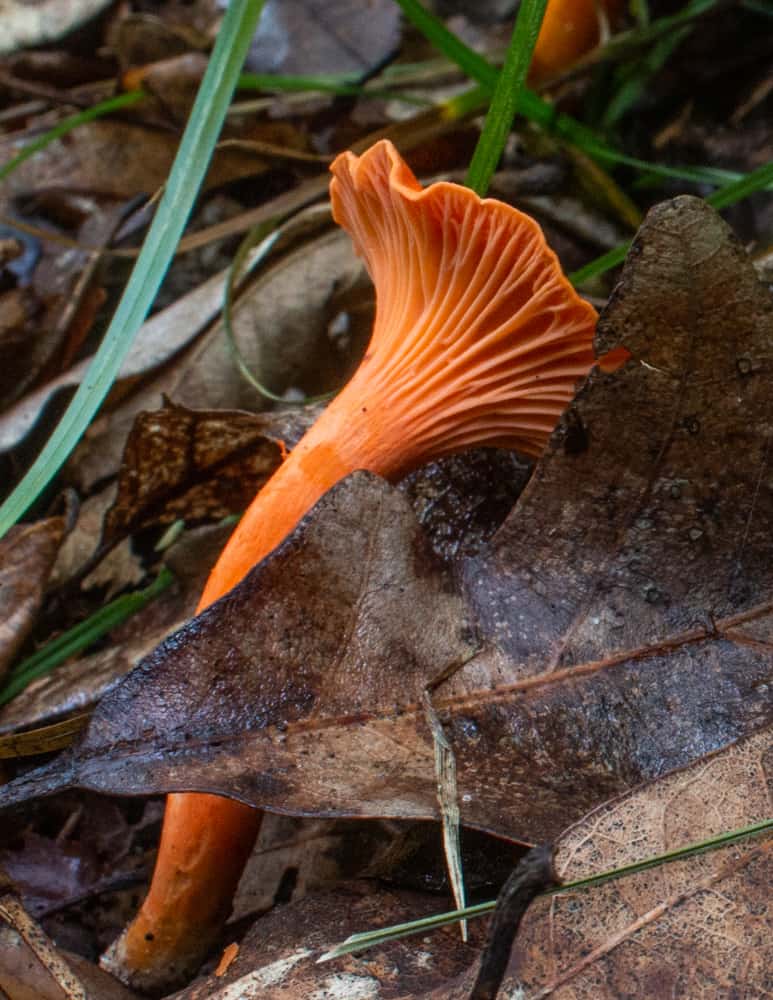
Cooking
Red chanterelles can be cooked just like any other chanterelle, but will cook a bit quicker as they're usually smaller. These grow low to the ground, so when you're harvesting them, make sure to trim any dirt from the stem as it can be very difficult to remove if it gets into the veins.
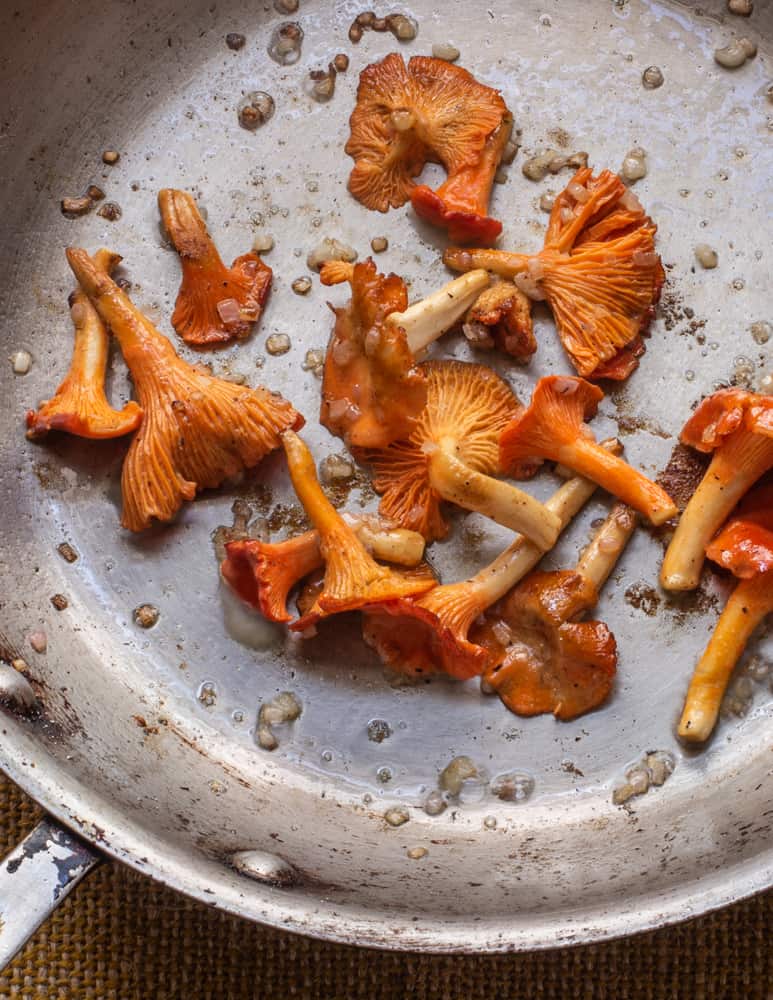
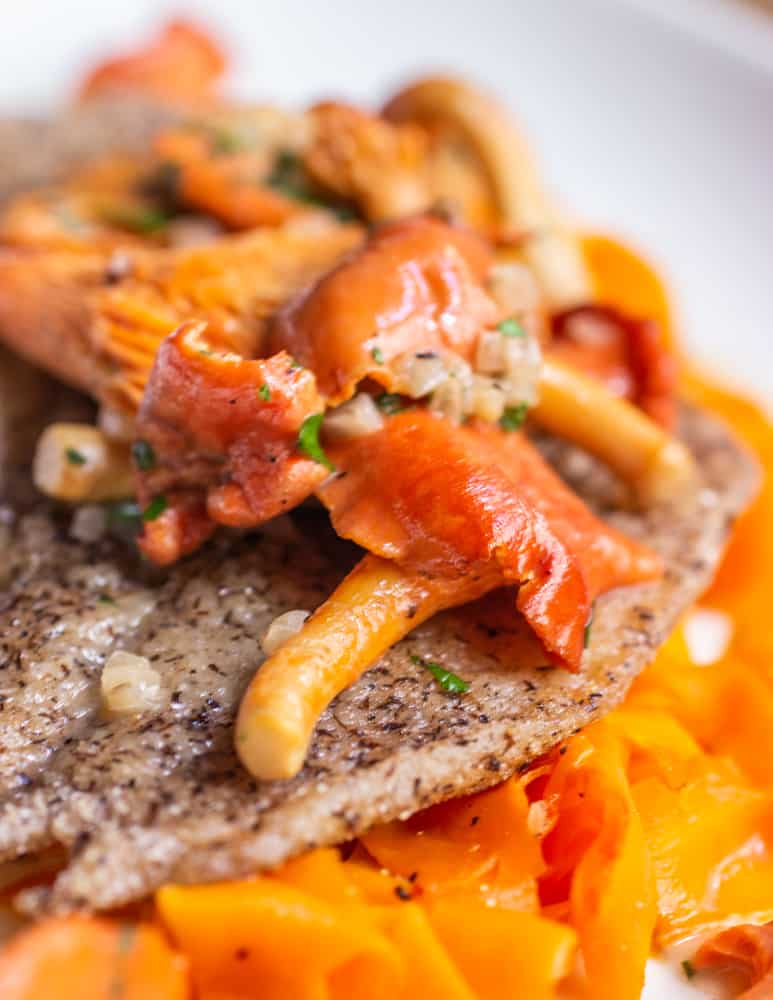
If the mushrooms are dirty, swish them in cold water to clean and allow to rest on paper towels until you need them. Kept in the fridge, fresh mushrooms will last for four or five days, and often longer.
Here's a few notes on cooking with them.
- Simple preparations are best. There's nothing wrong with just tossing them in a pan with a lump of butter.
- The aroma of the red chanterelles isn't as intense or fruity as golden chanterelles or black trumpet mushrooms.
- Their flavor ends with some peppery notes, almost a bit spicy.
- I don't like to cut these up since their usually small. Keeping them whole will preserve their flavor and shape.
- Since you can keep them whole, they're wonderful in soup, just like yellow foot chanterelles.
Preservation
Since their texture is closer to a chanterelle than a hollow black trumpet, or yellow foot chanterelle, drying is not a great way to preserve these. I would pickle, marinate or sauté in butter and freeze to preserve them. After they're cooked, I like to vacuum seal them for long-term freezing.
After they're frozen, you can take the mushrooms out and add them to any dish you're cooking.
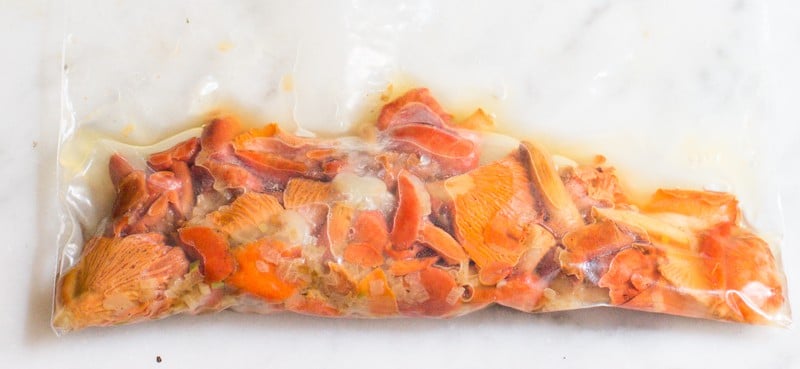
Recipes
Here's some red chanterelle recipes, or places they could be substituted. I recommend cooking them by themselves first to get a feel for them. After you've tried them by themselves, I would make a batch of my mushroom conserva below.
More
35 Essential Wild Mushrooms Every Forager Should Know
References
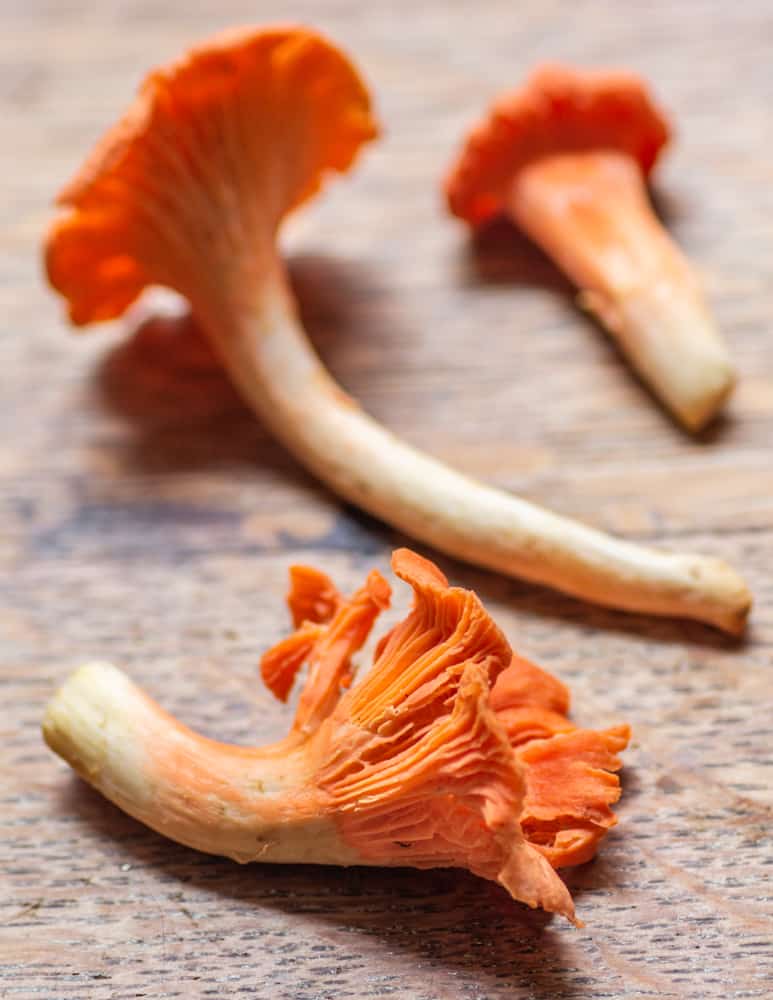

Keith
I love this site. I recently found red chanterelles, orange chanterelles (cap more like fronds, not a central stem with in-rolled cap), black trumpets, and a hen. I was able to clean the chanterelles right away, but not the black trumpets and hen...I was leaving for a short vacation and had to throw them all in the freezer (raw) or lose them for sure...not ideal, I know. What would you recommend for a thaw/prep procedure to make the most of this haul? Or...have I botched it?
Alan Bergo
Hi Keith. Freezing dirty mushrooms makes me shudder, but I've had the question before! What you'll need to do is completely thaw the mushrooms, then inspect them thoroughly for dirt and debris. This will probably mean washing them with water or submerging them, depending on how dirty they are. The hen will likely have a lot of waste/trim, the trumpets should be easier. Cook them down well and put some color on them and use them in a soup is my best advice.
Patty Dye
Hi. Thanks for the advice !
Being the only mushroom lover in my immediate family,
I've wondered..(as many others have I'm sure) how best
to preserve chanterelles. Is it safe to assume that you could do
this with most any chanterelles?
And what do you think of a dry saute before adding the oil ?
Alan Bergo
I don't recommend doing this with young golden chanterelles, they're much better pickled. Freezing cooked young chanterelles seems to destroy their texture. Older chanterelles don't have the same bouncy tooth as the young ones though, they're more soft, and could be cooked and frozen like this. It would be fine to dry saute the chanterelles before adding oil, especially if they're water logged.
John
I freeze golden Chanterelles regularly with no problem. Maybe you're not cooking the water out of them thoroughly? After cooking, I freeze them spread out on a cookie sheet and if I'm not going to eat them soon, I vacuum seal them.
I'm currently eating a batch of Red Chanterelles for the first time and was surprised by the peppery bite in the flavor.